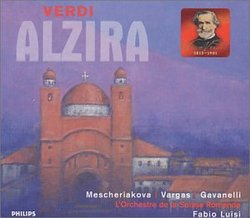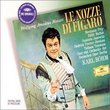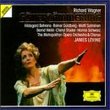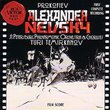| All Artists: Giuseppe Verdi, Fabio Luisi, L'Orchestre de la Suisse Romande, Choeur du Grand Théâtre de Genève, Ramon Vargas, Marina Mescheriakova, Jovo Reljin, Slobodan Stankovic, Wolfgang Barta Paolo Gavanelli Jana Iliev Title: Verdi: Alzira Members Wishing: 0 Total Copies: 0 Label: Philips Original Release Date: 1/1/2001 Re-Release Date: 9/18/2001 Genre: Classical Styles: Opera & Classical Vocal, Historical Periods, Classical (c.1770-1830) Number of Discs: 2 SwapaCD Credits: 2 UPC: 028946462829 |
Search - Giuseppe Verdi, Fabio Luisi, L'Orchestre de la Suisse Romande :: Verdi: Alzira
 | Giuseppe Verdi, Fabio Luisi, L'Orchestre de la Suisse Romande Verdi: Alzira Genre: Classical
Love, jealousy, vengeance, and forgiveness are the core emotions in this, the eighth of Verdi's 28 operas. Alzira is based on a play by Voltaire. What it lacks in fully developed, rounded characters and extended arias, it... more » |
Larger Image |
CD DetailsSynopsis
Amazon.com Love, jealousy, vengeance, and forgiveness are the core emotions in this, the eighth of Verdi's 28 operas. Alzira is based on a play by Voltaire. What it lacks in fully developed, rounded characters and extended arias, it makes up in swift, sharply focused dramatic power. Some crudities of Verdi's early style are still present, but so is ample evidence of the composer's maturity: orchestral subtleties, glowing lyric moments, and, in the spacious buildup of the finale, a mastery that weaves together complex emotional and musical strands. In the title role as the Inca princess pursued by the Spanish governor of Peru, Marina Mescheriakova is first-rate. She hones her big voice down to a whisper and also lets loose for the full-voiced, gorgeously phrased moments. Ramon Vargas is as effective, sounding like a young Domingo at times, his light lyric tenor expanding to fit the more muscular role of the rebel leader Zamoro, the heroine's true love. As the bad guy whose change of heart animates the theme of Christian forgiveness, Paulo Gavanelli displays a lean, bright baritone. He's equally effective in the character's obsessive deliriums and in his tender, dying turnaround. Fabio Luisi conducts stylishly, driving the drama along and drawing true Verdian phrasing from singers and orchestra. Even Verdi's lesser-known operas are worth hearing, and this worthy performance convinces that Alzira's neglect has been undeserved. --Dan Davis Similarly Requested CDs
|
CD ReviewsA Worthy Recording for Verdi's Little-Known Jem Joseph A. Newsome | Burlington, NC United States | 10/10/2001 (5 out of 5 stars) "It is unfortunate that so many of Verdi's early scores are known only through recordings. That being said, this recording is revelatory. Until Philips took the initiative to provide complete digital recordings of the works missing from their Complete Verdi Edition, the only recording of "Alzira" was an early 1980's affair on Orfeo featuring Ileana Cotrubas and Francisco Araiza. Though a fine recording in its own right, the Orfeo set is easily outclassed by its newer rival. Verdi's Peruvian love story is set to a plushly early Romantic score, and the melodic inspiration is, as always with Verdi, quite high. The soprano role has the benefit of some uniquely effective (and not merely exhibitionist) coloratura writing, and the role is well-sung throughout by Russian soprano Marina Mescheriakova. When I saw Ms. Mescheriakova sing the "Trovatore" Leonora at the Met in December 2000, I was most impressed by the purity of her phrasing and the way in which careful projection of her bright tone can produce stunningly beautiful pianissimi. This is in evidence throughout this recording--a considerable accomplishment. Finer still is Ramon Vargas' performance as her lover. Using his essentially light lyric voice with extraordinary refinement, Vargas sings Verdi's sweeping melodies with finesse and complete technical assurance, and the darkness of the lower voice altogether qualifies him for the heroic aspects of the role. If Vargas continues on the path evidenced by this recording, he will quickly and deservedly join Carlo Bergonzi (whom he resembles at times) and the young Jose Carreras among the upper eschelon of Verdian tenors. I also heard baritone Paolo Gavanelli at the Met, in the title role of "Rigoletto" in December 1999. Despite the slight bleat in his tone, Gavanelli impresses with his innate musicality and the bright, open quality of his distinct timbre. The core to Gavanelli's voice is quite firm, and the top notes are both well-centered and beautifully deep-toned. Gavanelli's performance of the finale, his grand scene of moral awakening, is the climax of an otherwise rather banal role. Fabio Luisi conducts his mostly excellent orchestra in a thoroughly competent, committed reading of the score which is well within what one's expectations for rhythmic fervor in a younger Verdi score. All things considered, an outstanding achievement, worthy of the tribute to the centennial of the composer's death." How Could Something This Lovely Be A Failure? John G. Gleeson Sr. | Frederic, Mi USA | 11/23/2001 (5 out of 5 stars) "And the answer is the plot. While it is easy to climb on the critical bandwagon and deplore Verdi's early works, true opera lovers have recognized the true beauty in the maestro's early works, and Philips has to be congratulated for producing some consistantly excellent recordings of these treasures. The company has, over the years, employed the finest voices and conductors to bring early Verdi to us, and Alzira is consistantly fine from beginning to end. What it lacks in plot that failed to please mid 19th century operagoers, it more than makes up in musical intensity and lyrical beauty. All of the principal singers are excellent in their roles. Ramon Vargas is an exciting new tenor, whose recent CD of Verdi arias should be a "must have". If he avoids the temptation to perform heavier roles, his spinto voice shoul please us for years. Marina Mescheriakova is evidence that we still have fine Verdi sopranos around. She has a meltingly lovely voice and fine interpretive skills. Baritone Gavanelli is good, but not great, in the role of Gusmano. Maestro Luisi conducts with a brisk but authoritative touch. The recording is outstanding sonically. A Verdi fan? Buy it now! Interested in learning more about Verdi or opera? Ditto!" Not Verdi's Greatest - but certainly worth hearing Ed Beveridge | London, England | 03/27/2002 (4 out of 5 stars) "I confess it - I love early Verdi. I am always drawn to new recordings of works like this because with a fine cast and conductor they usually give great pleasure. So it is here in the much maligned "Alzira". The main drawbacks of the piece are dramatic, not musical - the plot is very thin, and the characters don't develop to any significant extent. We are left with stock situations in a rather exotic location, and I'm sure that the opera would be a total headache to bring to the stage.Luckily, it clearly can be made to work in the recording studio. The music is middling Verdi with patches of excellence. For example, Alzira's Act 1 reverie, her duet with Gusman in Act 2 (echoes of Leonora and di Luna, anyone?), Zamoro's aria and cabaletta in the same act and the finale - a really fine ensemble which tells us that this composer will eventually write Act 3 of Otello. Certainly much of the music is rather formulaic and it lacks the genius and inventiveness of later works, but I'd rather hear middle-of-the-road Verdi than a lot of what we encounter.The recording is excellent - La Suisse Romande, under Fabio Luisi, give real verve and drive to the score. Mescheriakova has a gorgeously rich, bright soprano over which she has ample control of dynamics and enough agility to sketch in the occasional coloratura flights. She make as much as she can of the title role which must be a frustrating sing, as her music and character are just too limited for her performance truly to take flight. Vargas, too, has some really heroic moments in the context of an attractive, lyrical vocal performance, the best I have yet heard from this valuable young tenor, and Gavanelli (though his fast vibrato and slender tone limit his dramatic effectiveness) turns in a creditable performance. Smaller roles are unexceptionable.A find, then - it's not a masterpiece, but there's plenty to keep Verdi-curious or Verdi-loving listeners occupied, and the performance is very good indeed."
|

 Track Listings (15) - Disc #1
Track Listings (15) - Disc #1








